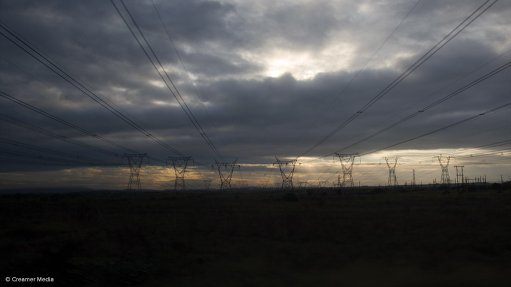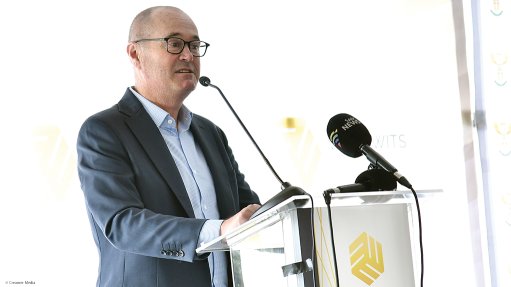Rights body outlines legislative path to combat water infrastructure attacks
The South African Human Rights Commission (SAHRC) has published a comprehensive policy brief highlighting the various legislative and policy mechanisms available to the State to tackle the so-called ‘water mafias’ and the systematic sabotage of essential water infrastructure.
The policy brief, titled ‘How to address systemic sabotage of essential water infrastructure’, seeks to be a clarion call to South Africa’s law enforcement agencies and other State role-players, offering several advisory recommendations to address the crisis.
“The SAHRC has noted with concern the prevalence of systemic sabotage of essential water infrastructure associated with the emergence of water mafias in South Africa,” the commission says, noting that this poses significant danger and is hampering the State’s efforts to achieve universal access to water.
Water services authorities’ inability to provide adequate water supplies has led to the emergence of organised syndicates deliberately sabotaging water infrastructure, particularly at municipal level, with the sole objective of profit-making.
Water-related crimes vary from severe vandalism, corruption and procurement irregularities, to violent attacks on municipal officials, who, in some instances, are held hostage and tortured, while others are even murdered, the policy document highlights.
“To combat these offences, it is essential to raise the profile of these offences, to mobilise more resources to combat them, to increase public awareness by improving their visibility and to use convictions as a deterrent to future crimes.”
Given the serious impact of attacks on water services infrastructure and the rising violence against local government officials, it is in the public interest to classify these activities as national priority offences.
The policy brief, which was published with the expert assistance of the Dullah Omar Institute at the University of the Western Cape, urges the Cabinet member responsible for policing to include water services infrastructure among policing priorities and to finalise and adopt the Draft National Policing Policy, which was developed in 2023.
The document also urges the Presidency to proclaim and promulgate the remainder of the Critical Infrastructure Protection Act 8 of 2019, and calls on the Minister responsible for the administration of the Act to declare all water services infrastructure as critical infrastructure once it becomes operational.
“There is no doubt that water-related infrastructure plays a significant public and economic role, and its disruption or immobilisation has the potential to prejudice stability and undermine the health or safety of the public. Water-related infrastructure, such as water pumps, water valves, water reservoirs and water treatment works, serves both a public and economic role,” the report highlights.
The policy brief further recommends that the deliberate sabotage of water services infrastructure be considered a crime in terms of Section 3(1) of the Criminal Matters Amendment Act 18 of 2015.
“The deliberate sabotage of water-related infrastructure to the extent where it is deliberately accompanied with an intent to instil fear, public panic or overthrow the current order while causing serious water disruption should be considered as constituting a terrorist activity in terms of the Protection of Constitutional Democracy against Terrorist and Related Activities Amendment Act 23 of 2022.”
Also recommended is that the South African Police Service (SAPS) deploy sufficient resources to help water services authorities safeguard and protect water services infrastructure.
Additionally, the policy brief urges the Directorate for Priority Crime Investigation to accept that activities targeting water service infrastructure are a national priority crime and, consequently, to take immediate steps to investigate allegations of such activities, and create a dedicated channel through which water services authorities may report or provide information about suspicious activities involving water infrastructure.
The report also notes that the National Prosecuting Authority (NPA) needs to take the necessary steps to make the prosecution of activities targeting water infrastructure a priority, both internally – including through mobilising an adequate number of experienced prosecutors – and by collaborating with other key stakeholders, including the Hawks, the criminal intelligence division of the SAPS and water services authorities.
Further, it says the government institutions responsible for gathering crime intelligence should take measures to improve intelligence on activities targeting water services infrastructure and share any knowledge gained with the Hawks, the NPA and other relevant stakeholders.
“Strengthening crime intelligence is essential to ensuring that crime prevention efforts are proactive, evidence-based and able to anticipate threats before they materialise,” the SAHRC notes, adding that crime prevention is more cost-effective and socially beneficial than reactive enforcement.
“South Africa’s crime prevention system depends on the work of crime intelligence, a division within the SAPS responsible for gathering, analysing and disseminating intelligence to prevent and disrupt criminal activities. When properly resourced and managed, crime intelligence enhances early-warning capabilities, identifies organised crime networks – including those behind water infrastructure sabotage – and supports targeted policing operations.”
The SAHRC further suggests that the Office of the Chief Justice should consider allocating sufficient courtrooms and presiding officers to hear any prosecutions of activities targeting water services infrastructure.
Meanwhile, to address these challenges, the report urges water services authorities to take immediate disciplinary and other measures to deal with municipal officials participating in organised crime or corrupt activities; take immediate measures to blacklist suppliers found guilty of any criminal activity that targets water infrastructure, including tampering with, vandalising or causing damage to such infrastructure; and report any suspected recurrent damage to water services infrastructure to the Hawks.
The water services authorities should also consider expanding their capacity to provide water tankering or related services and thereby remove the motive behind water services infrastructure sabotage.
The report further recommends that various government departments, such as the Department of Water and Sanitation and municipalities, working together with the SAPS, should consider carrying out awareness campaigns to “conscientise the public” and urge communities and households to report to law enforcement agencies activities linked to the deliberate sabotage of water infrastructure.
The SAHRC has shared the policy brief with the Presidency, the Minister of Police, the Minister of Water and Sanitation, the National Director of Public Prosecutions, and the Office of the Chief Justice for them to take note of the advisory recommendations contained in the policy brief.
“The SAHRC urges government not to dither in tackling and addressing the systemic sabotage of essential water infrastructure. The phenomenon of water mafias and systemic sabotage of essential water infrastructure deserves urgent and serious attention. If left unchecked, the systemic sabotage and destruction of essential water infrastructure will imperil the capacity of the State to fulfil its constitutional obligation of providing water and render the constitutional ideal of access to water for everyone a pipe dream.”
Article Enquiry
Email Article
Save Article
Feedback
To advertise email advertising@creamermedia.co.za or click here
Comments
Press Office
Announcements
What's On
Subscribe to improve your user experience...
Option 1 (equivalent of R125 a month):
Receive a weekly copy of Creamer Media's Engineering News & Mining Weekly magazine
(print copy for those in South Africa and e-magazine for those outside of South Africa)
Receive daily email newsletters
Access to full search results
Access archive of magazine back copies
Access to Projects in Progress
Access to ONE Research Report of your choice in PDF format
Option 2 (equivalent of R375 a month):
All benefits from Option 1
PLUS
Access to Creamer Media's Research Channel Africa for ALL Research Reports, in PDF format, on various industrial and mining sectors
including Electricity; Water; Energy Transition; Hydrogen; Roads, Rail and Ports; Coal; Gold; Platinum; Battery Metals; etc.
Already a subscriber?
Forgotten your password?
Receive weekly copy of Creamer Media's Engineering News & Mining Weekly magazine (print copy for those in South Africa and e-magazine for those outside of South Africa)
➕
Recieve daily email newsletters
➕
Access to full search results
➕
Access archive of magazine back copies
➕
Access to Projects in Progress
➕
Access to ONE Research Report of your choice in PDF format
RESEARCH CHANNEL AFRICA
R4500 (equivalent of R375 a month)
SUBSCRIBEAll benefits from Option 1
➕
Access to Creamer Media's Research Channel Africa for ALL Research Reports on various industrial and mining sectors, in PDF format, including on:
Electricity
➕
Water
➕
Energy Transition
➕
Hydrogen
➕
Roads, Rail and Ports
➕
Coal
➕
Gold
➕
Platinum
➕
Battery Metals
➕
etc.
Receive all benefits from Option 1 or Option 2 delivered to numerous people at your company
➕
Multiple User names and Passwords for simultaneous log-ins
➕
Intranet integration access to all in your organisation


















